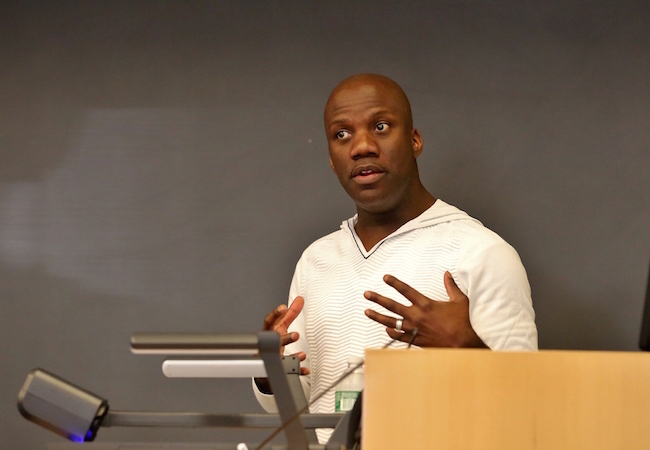Helping high school athletes make the right college choice
March 17, 2016
Shaun Harper offers advice for high school athletes, their families, coaches, teachers, and advisors about picking the right college for them.
For high school athletes, an offer to play sports in college represents the fulfillment of a lifelong dream. But for the vast majority of college athletes who won’t be playing in the NFL or making an Olympic team, college can’t just be about sports. It needs to be a place where they can develop as individuals and prepare for a career.
Recently, Shaun Harper, director of Penn GSE’s Center for the Study of Race and Equity in Education, issued a report examining the poor graduation rates for black male student-athletes at the biggest college programs. His report included questions student-athletes, their families, high school coaches, and advisors should ask before committing to a college. These questions are valuable for boys and girls aspiring to play a sport in college, no matter how big or small the school.
What’s my academic support structure?
Many college coaches sell high school athletes on the athletic program’s tradition. They'll conjure up plans for how the recruit will win the big game, show off the weight room and, in the highest levels, brag about the number of players they’ve had go pro. But it’s important for recruits and those supporting them to go deeper.
What advisors do you have to help me stay on track to graduate? What do coaches do to prioritize academics during the season? These are especially important questions for Division II and III programs, which often have smaller support staffs for their athletic programs than are found in Division I.
What’s my college experience like?
Between the games, the practices, the film sessions, and a host of team activities that are “voluntary” in name only, a roster spot often defines an athlete’s college experience. While that schedule might move a recruit up the depth chart, it’s unlikely to yield a résumé and portfolio that is well-suited for life after graduation.
Students who are highly engaged inside and outside the classroom are considerably more likely than are their disengaged peers to graduate from college and compete successfully for highly-coveted jobs and admission to graduate school. They also learn more, earn higher GPAs, and develop a wider array of skills that will be useful in their lives and careers after college. Athletes shouldn’t have to choose between their sport and these experiences.
Ask how many players from the team studied abroad or did internships in their fields this past school year. Ask for specific examples of ways a coach encourages academic success and the holistic development of his or her players.
What am I doing after college?
Only a miniscule percentage of college players will have careers as athletes. And even the biggest stars can have their plans derailed by injury. So focus on which college will best prepare you for life after you leave the locker room.
Ask – what is the graduation rate for athletes? How does that compare to non-athletes? What sort of degrees are most of your players earning? How prepared will I be for a career in my field? What careers are your recent graduates entering?


